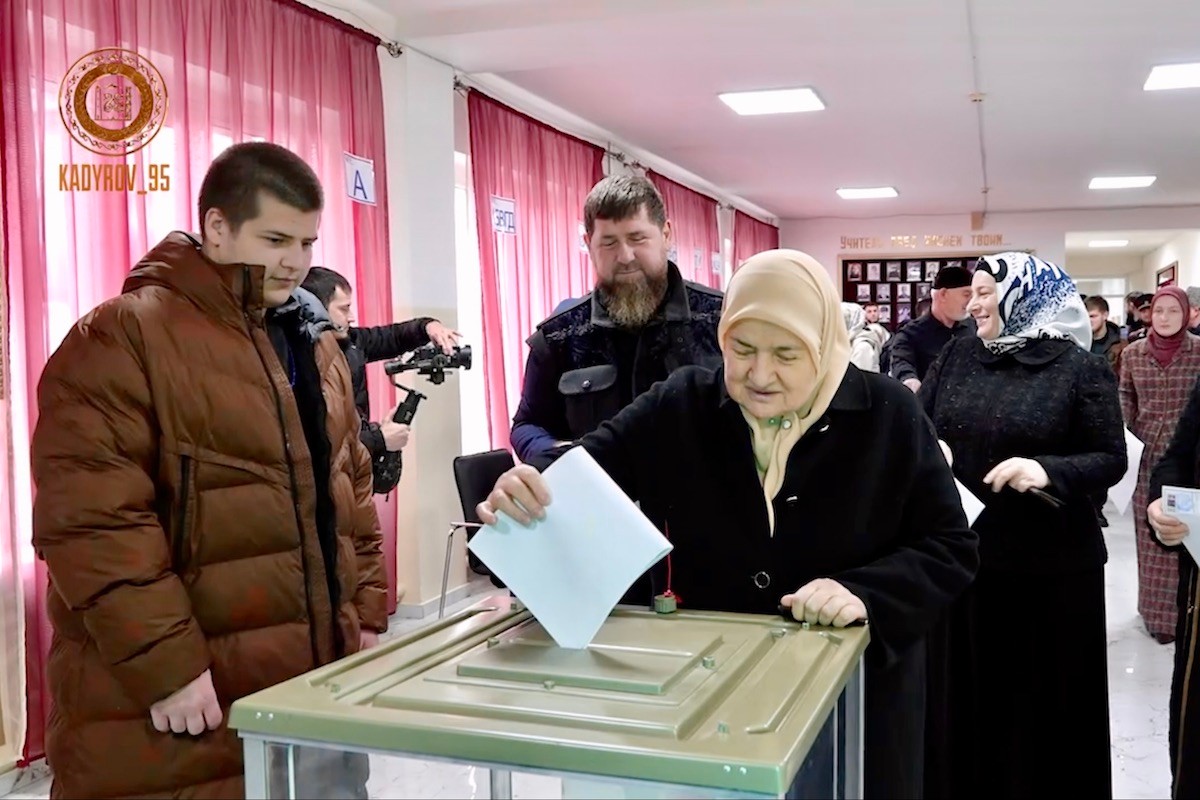‘High turnout’ in North Caucasus as Putin receives ‘99% of vote’ in Chechnya

The North Caucasus has recorded some of Russia’s highest voter turnout in the Russian presidential elections, with President Putin winning 99% of the vote in Chechnya. Reports of fraud and campaign violations were reported, with protesters detained.
Chechnya’s voter turnout of 97% in the 15–17 March elections was the highest figure across all of Russia.
Kabardino-Balkaria recorded a turnout of 93%, North Ossetia, Karachay-Cherkessia, and Ingushetia 90%, and Stavropol Krai 89%.
The official results gave Vladimir Putin 99% of the vote in Chechnya, the highest figure among Russian regions. In Kabardino-Balkaria, he received 92%, and 90% in Karachay-Cherkessia, North Ossetia, and Ingushetia.
The elections saw Vladimir Putin secure a fifth term in office, with all serious political challengers having been either barred from running, imprisoned, or murdered.
Chechnya’s Election Commission on Sunday stated that no violations were recorded during voting. State channel ChGTRK Grozny wrote the same day that the elections had been held in a ‘festive atmosphere’.
However, Telegram channel and monitoring organisation Chronicle of the Day of Voting published a message reportedly from an anonymous Chechen civil servant, stating that state employees were forced to vote at multiple polling stations on multiple days, known as ‘carousel voting’.
‘On the first day, I was required to come and cast my ballot three times at three different polling stations, probably to ensure this turnout. On the second day, I ‘chose’ [who to vote for] at four more. Today, they’ve assigned [me] several schools, I’m supposed to be there’, read the comment.
They added that they and their colleagues were driven around Chechnya ‘on buses and minibuses’ to cast votes, and that people working at polling stations did not react to incidents of visible ballot-stuffing.
In Daghestani and Chechen polling stations, official portraits of Vladimir Putin remained visible during voting.
Caucasian Knot reported that prior to the elections, campaign violations were recorded across the North Caucasus. A North Ossetian state university reportedly published material campaigning for one of the presidential candidates in its Telegram channel, featuring a photograph of a teacher and students standing in front of a campaign banner. Following complaints, the post was reportedly deleted.
The headquarters of one of the candidates reportedly also organised an excursion for university students in Cherkessk, to the Museum of the History of the Church and the Cossacks, which critics called an ‘abuse of administrative resources’.
The outlet added that a Chechen ‘high-ranking official’ published content in support of one candidate, while Karachay-Cherkessia’s election commission announced a competition with a prize fund of more than ₽1 million ($10,000) to take place during the elections. Lotteries and ‘risk-based games’ that are related to elections are prohibited during the election campaign period.
Activists detained
A number of individuals were reportedly detained for campaigning against Putin or challenging the elections.
Activist Ibragim Parkuyev was detained in Makhachkala, the capital of Daghestan, on 16 March, on charges of disobeying the demands of a police officer, according to RFE/RL. Parkuyev had previously demonstrated in support of opposition politician Alexei Navalny.
A day later, an administrative case was opened against a 16-year-old student in Makhachkala for campaigning during the elections, which is punishable by a fine of up to ₽2,000 ($220). Sapa Kavkaz reports that the student was found to be carrying leaflets relating to the ‘Noon against Putin’ protest campaign, one of which was attached to the fence of the college where they were studying.
The campaign, championed by Navalny and his wife, Yulia Navalnaya, called on those who opposed Putin to gather at polling stations en masse at 12:00 on the last day of voting, to vote or spoil their ballots.
In Karachay-Cherkessia, a woman was detained after pouring a coloured dye into a ballot box on 15 March. The woman was taken to the investigative committee for questioning, while the chair of the republic’s election commission stated that votes and ballots from the ballot box would be counted despite the incident.





